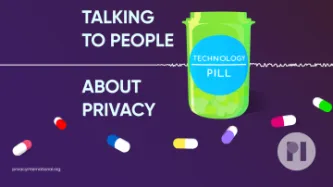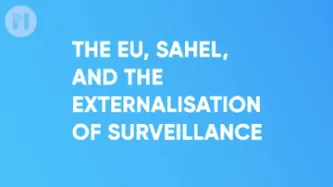Advanced Search
Content Type: Advocacy
Despite repeated recommendations by the UN Human Rights Council and the UN General Assembly to review, amend or enact national laws to ensure respect and protection of the right to privacy, national laws are often inadequate and do not regulate, limit or prohibit surveillance powers of government agencies as well as data exploitative practices of companies.
Even when laws are in place, they are seldom enforced. In fact PI notes how it is often only following legal challenges in national or…
Content Type: Long Read
Imagine your performance at work was assessed directly from the amount of e-mails sent, the amount of time consumed editing a document, or the time spent in meetings or even moving your mouse. This may sound ludicrous but your boss might be doing exactly that. There are more and more stories emerging of people being called into meetings to justify gaps in their work only to find out their boss had been watching them work without their knowledge.
The Covid-19 global pandemic has reshuffled the…
Content Type: Press release
To mark 10 years of the Home Office's hostile environment, a coalition of charities last night projected a vast message on the Home Office's Lunar House building in South London, to draw attention to Home Secretary Priti Patel's plans to GPS ankle tag thousands of migrants - a coercive, costly, and dehumanising measure.
As part of a week of events to mark 10 years of the "hostile environment", a set of policies designed to make life difficult for what…
Content Type: News & Analysis
Last night, PI, Migrants Organise and Bail For Immigration Detainees joined forces to shine a light on the enduring plight of migrants in the UK who are subject to hardline and dehumanising Home Office policies.
Our joint light projection marked the 10 year anniversary of former Home Secretary Theresa’s May’s infamous 'hostile environment', a policy purposefully cruel that includes indefinite detention of migrants and refugees.
The past decade has also seen the steady creep of data sharing…
Content Type: Video
LinksA resource for teachers we've been working with Ina on (consultation draft at the moment so please get in touch if you have thoughts!)More about critical data literacyThe database of resources for teaching about big data and algorithmic systems Ina mentionedPI's guides to help you and your loved ones protect yourselves online
Content Type: Key Resources
Content Type: People
Sarah has a particular interest in upholding human rights and the rule of law with the increasing use of new technologies in policing and counter-terrorism measures and their wider implications on society and enjoyment of human rights. As well as maintaining privacy in relation to emerging digital health technologies and access to reproductive rights.
Sarah holds a BA Politics and LL.M Business and Human Rights from Queens University Belfast. Sarah is from Northern Ireland and has experience…
Content Type: Advocacy
The proposal seeks to impose mandatory environmental and human rights due diligence on companies of a certain size that operate in certain sectors.
Our submissions address the very limited personal and material scope of the current draft of the Directive, which is unlikely to subject the most problematic technology and surveillance companies to the new due diligence obligations.
Content Type: Key Resources
A. Risks to consider
Defamation: The law of defamation protects a person’s reputation against unjustified interference. You may get sued for defamation by a private actor you make allegations against. Defamation laws differ between jurisdictions and the burden of proof might be entirely on you.
Unlawful obtention of information: Depending on your jurisdiction, certain types of investigations might be in contravention of the law (such as publishing leaked information or hacking).…
Content Type: Key Resources
The first step when looking at technology is to find basic information about it - to define and categorise it. Looking at the Wikipedia page of a given technology is often a good starting point and will help you clarify what is implied within a technology (for example for Facial recognition). This is particularly useful when there is no specific technology that is mentioned in the partnership or when you are looking at a tender. You might also want to check the company’s marketing materials to…
Content Type: Key Resources
Obtaining adequate information about a public-private partnership is often difficult, especially when sensitive areas of government are involved, such as intelligence and law enforcement. Information about such activities is often purposefully withheld from the public and guarded by excessive laws and punishments.
But if it is safe to access them, there are many methods and resources out there which can help. Many of these sources are already readily available online, while others require desk…
Content Type: Key Resources
The UN Guiding Principles are a set of guidelines for states and companies to prevent, address and remedy human rights abuses committed in business operations. The UN Human Rights Council unanimously endorsed the UN Guiding Principles in its resolution 17/4 of 16 June 2011.
The UN Guiding Principles provide the authoritative global standard for action to safeguard human rights in a business context. As such, in the course of an investigation, they can be used to assess the compliance of a…
Content Type: Key Resources
There are no universally recognised data protection standards, but regional and international bodies have created internationally-agreed-upon codes, practices, decisions, recommendations, and policy instruments. The most significant instruments are:
The Council of Europe Convention for the Protection of Individuals with regard to Automatic Processing of Personal Data (No. 108), 1981 as amended in 2018;
The Organization for Economic Co-operation and Development Guidelines on the Protection…
Content Type: Key Resources
Public-private partnerships might very well involve a technology that is well-known and already widely deployed in other contexts, but it might also be a ground for innovation and novelty.
We can identify two main types of innovation:
A new technology that isn’t widely used or hasn’t been deployed in real world context (outside of a lab or a research paper);
A new set of features added to an existing technology which greatly expand its performances and capabilities.
Another type of “…
Content Type: Key Resources
You should check that certain documents and processes are in place so that the contracting state and company are accountable, that there is proper oversight, and adequate redress mechanisms. Note that you should consider the entire life cycle of the partnership. First at the procurement stage, has the procurement process for this contract followed local or international procurement rules? And are those procurement rules adequate? Has there been adequate transparency throughout the procurement…
Content Type: Key Resources
i. Added Literature review
There are several resources available that simplify and popularise complex technologies, starting with Wikipedia. Other resources can be tremendously useful even with little to no technical background, such as semi-specialised press. See for example:
MIT Technology review (e.g. quantum computing)
ArsTechnica, (e.g. on NFTS)
PC Mag (e.g. on 5G Mag)
Academic papers are also an avenue to find information although the language might be less accessible without…
Content Type: Call to Action
Content Type: Key Resources
Data protection and privacy
Once you’ve assessed where the data comes from, have you assessed whether the data collection or sharing is lawful?
Is this lawful basis explicitly stated in the documentation of the partnership?
Is the data being collected in ways that people could reasonably expect?
Have the data controllers considered the risks to the fundamental rights and freedoms of the people whose data will be collected?
What will the consequences be of people’s data being…
Content Type: Key Resources
Can you broadly define the technology at stake and what it does?
What is the role of data in the technology at stake? (data collection system, data transmission system, data storage system, data processing system)
What are the risks associated with this technology for each particular system?
How innovative and ground-breaking is the technology?
[Optional] What are the risks associated with the innovation factor?
Can you explain how the technology functions in practice?…
Content Type: Video
Links
Giacomo’s report on Europe’s Shady Funds to Border Forces in the Sahel https://privacyinternational.org/news-analysis/3223/europes-shady-funds-border-forces-sahel
Giacomo’s report on The European Chase for Saharan Smugglers https://privacyinternational.org/long-read/3347/european-chase-saharan-smugglers
Privacy International’s disclosures on the EU’s surveillance aid https://privacyinternational.org/long-read/4291/surveillance-disclosures-show-urgent-need-reforms-eu-aid-…
Content Type: Call to Action
Content Type: Advocacy
Now is the time to strengthen not weaken data protection to keep us all safe. Here we outline some edited areas of our consultation response that highlight the impact of the proposed loss or weakening of many important protections:
The proposal to broadening consent and further processing for research purposes:
PI urges caution with regard to provisions that seek to potentially undermine the strict conditions around obtaining consent. The GDPR placed stronger conditions on obtaining consent…
Content Type: Video
Links
You can check out IRPI Media at https://irpi.eu
Their series on surveillance (in Italian) is at https://irpimedia.irpi.eu/sorveglianze/
Their report on Med-Or (in English) is at https://irpimedia.irpi.eu/en-surveillances-medor-leonardo-marco-minniti/
Their report on Cy4Gate (in English) is at https://irpimedia.irpi.eu/en-surveillances-cy4gate-united-arab-emirates/












